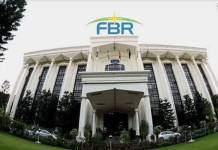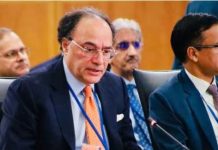ISLAMABAD: The Federation of Pakistan Chambers of Commerce and Industry (FPCCI) Presidential Candidate for the upcoming election 2024 Muhammad Ali Sheikh, stressed the need for implementing structural reforms for good governance, curbing unproductive state expenditures, expanding the tax base, fostering public-private partnerships, and reallocating resources to critical sectors to stimulate sustainable growth, as fiscal discipline cannot be achieved without initiating structural reforms.
Muhammad Ali Sheikh said that we must maintain fiscal discipline and establish controls to create fiscal space to extend relief to the business community.
Quoting the reports, he said that the budget deficit continues to grow, entangling Pakistan in an unrelenting cycle of debt. Even if we exclude the impact of debt servicing, our revenues fall short of covering other expenses, implying that all these are met from borrowed funds. At the close of the fiscal year, Pakistan recorded a budget deficit of Rs 6.52 trillion, equivalent to 7.7% of the GDP, a slight decrease from the previous year’s 7.9% of GDP. However, in absolute figures, the budget deficit surged by a substantial 24%, or Rs 1.26 trillion, within just one year.
Due to this bleak scenario, the BMP leader said and added that the primary balance registered a negative Rs 690 billion in FY 2023. Encouragingly, Pakistan achieved a noteworthy reduction of Rs 1.3 trillion or 67% year-on-year in its debt portfolio at the primary balance level during FY 2023. According to the Fiscal Operation report the primary deficit, which stood at 3.1% of GDP in FY2022, was reduced to a more manageable level of 0.8% of GDP in FY 2023. This improvement has created some fiscal room, and with continued efforts we can attain a primary surplus, representing the fundamental level of financial discipline.
The FPCCI presidential candidate by the BMP Muhammad Ali Sheikh said that it is encouraging to note that at the consolidated level, the government successfully attained an overall primary surplus of Rs 503 billion. However, by end of the third quarter of FY 2023, overall budget’s balance showed a negative figure of Rs 3.07 trillion. Yet, in the last quarter of FY 2023, primary surplus turned into primary deficit, with latter recording a primary deficit of Rs 1.1 trillion.
The budget deficit in last quarter of FY 2023 surged to nearly 112% of the cumulative figures from July 2022 to March 2023. Pakistan’s budget deficit for the initial nine months amounted to approximately Rs 3 trillion, but in Q4 FY23 alone, it registered a substantial increase of Rs 3.4 trillion. It’s worth noting that in the latest budget documents released in June 2023, revised estimate for primary deficit in FY23 was Rs 421 billion.
However, there was a primary balance overrun of Rs 690 billion, marking an increase of Rs 269 billion, which is 64% higher than the revised estimates for FY 2023 shared earlier in June of the same year. Contrastingly, according to the budget document from the previous year, a surplus of Rs 153 billion was projected. This highlights the inadequacies in financial planning at ministerial level.
While many countries are implementing privatization policies for SOEs, Pakistan remains in debate over the issue without officially announcing any plans for disinvesting in such entities. Meanwhile, the government continues to inject substantial sums of money in the form of subsidies and grants each year to sustain the operations of these unprofitable entities.
Ali Sheikh said the focus of the caretaker government to date is not on implementing structural politically challenging reforms but on heavy reliance on realizing pledged foreign direct investment and crackdowns on markets infected by widespread speculations/smuggling with a view to taking the economy out of its ongoing deepening economic impasse. While one would no doubt support these measures yet economic reforms as well as improving governance are critical to ensuring that the economy moves out of the continuing logjam that successive administrations have pushed it into.

















